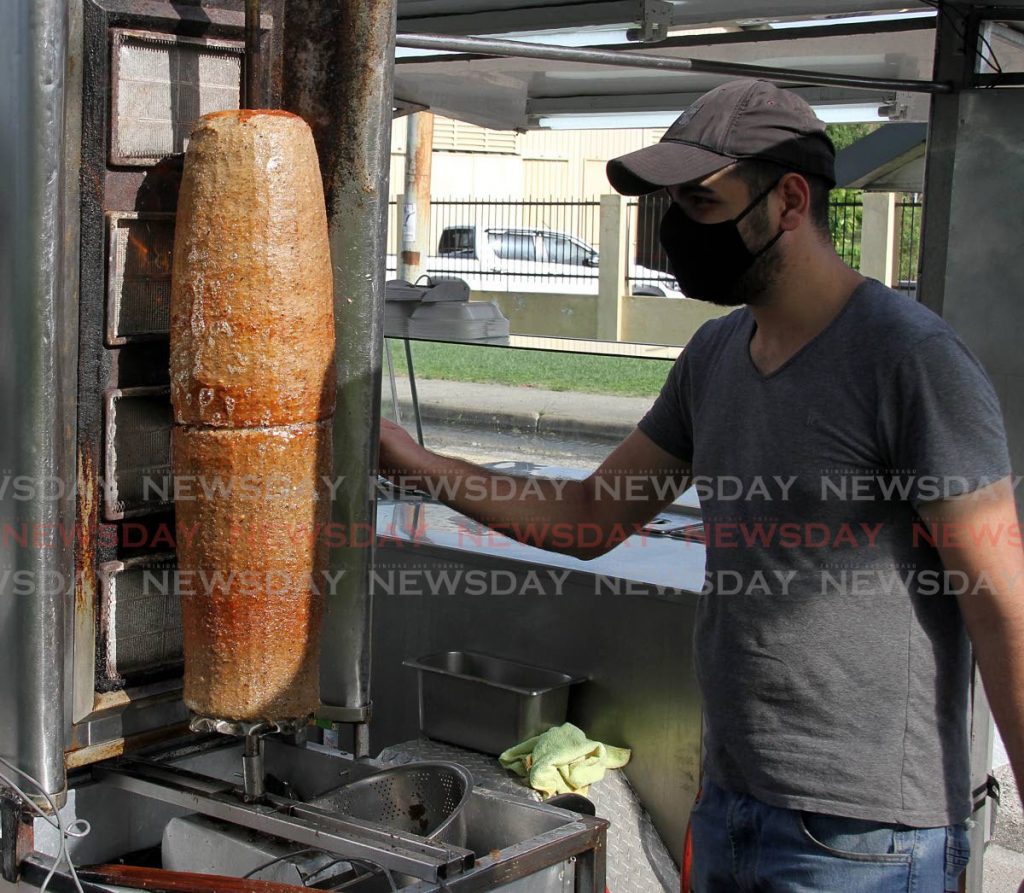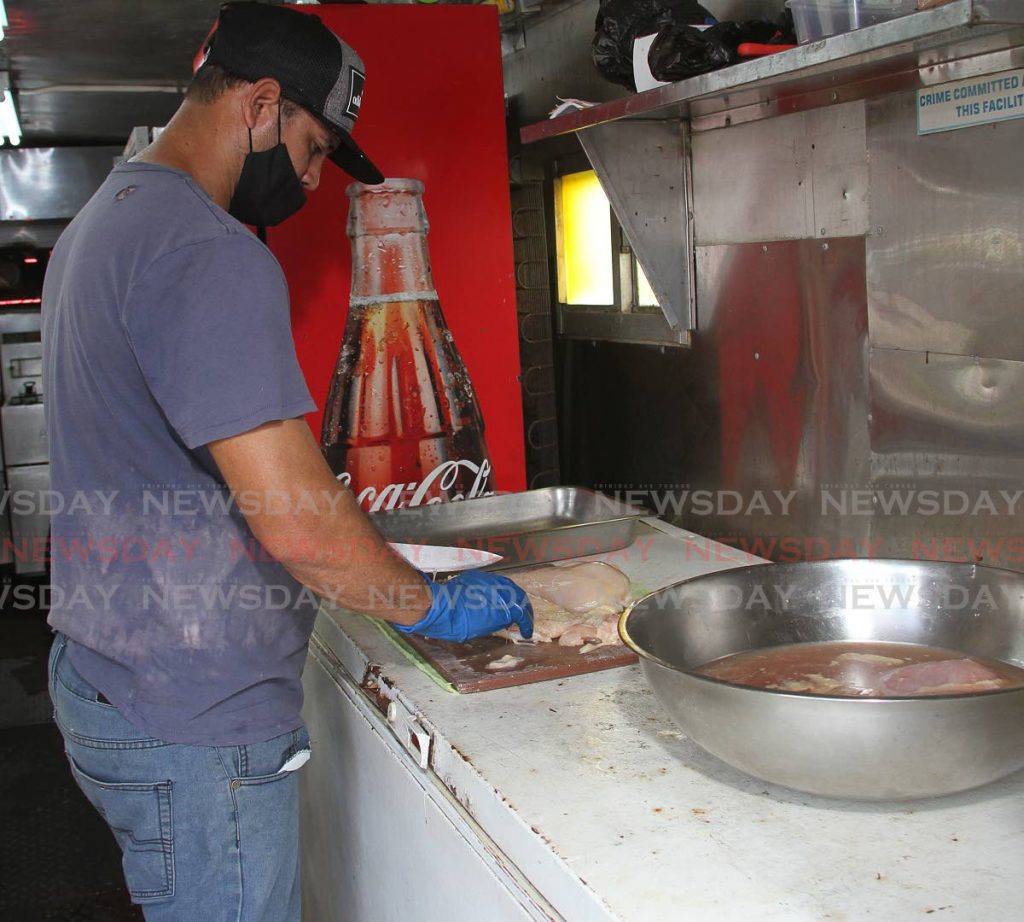Food truck vendors barely get by on Cross Crossing

When the Khalifa family moved from Syria to TT 13 years ago, they brought with them their specialities in cooking and food preparation.
While the style of food is not something that is new to TT’s food industry, the Khalifas said it was something they enjoyed doing and eventually turned it into their main source of income.
The family owns and operates a mini franchise — Smiley’s — on the Cross Crossing food strip in San Fernando, where they sell gyros, burgers, wraps, sandwiches, barbecue meats, jerk-style meats, fried foods, rice, pasta, fries and much more. They have five food trucks owned by brothers Ghaith and Abdo Khalifa.
Most of the work is done by the family, inclusive of their cousins who live near Gulf View and an additional five employees. Speaking with Business Day on Tuesday, Ghaith Khalifa said things were bad in his homeland, and they needed to desperately move. He did not share much about his struggles but said the decision was taken to move to TT because his brother Abdo was already living here.

The culture was different, but they soon adapted and carried on with their work as food vendors, he said.
“We moved from Syria 13 years ago because of the civil war and have started selling street food. It was difficult as with everything one could imagine when moving to a new country,” Khalifa said.
He said the family enjoyed sharing their food delights with locals. And while they would like to own a restaurant, the cost factors involved in doing so were too much. Khalifa added this did not deter their spirits and they worked with what was available to them to continue sharing their style of food with the public.
“Selling food like this was easier for us to do because the capital needed to open and operate a restaurant was too much. This has always been the type of work we did; we specialise in food. We slowly expanded and had a good business until the pandemic struck,” Khalifa said.
Government’s covid19 restrictions and the implementation of the state of emergency and curfew led to a closure of the food sector for almost three months this year. In 2020, the sector faced similar closures. On July 19, the sector was partially reopened allowing curbside pickup which included street food vending, drive-through services and deliveries but prohibited in-house dining.
Business owners in the sector have been challenged to reinvent their businesses, but for some, they just do not have the means to. Some food establishments upon this reopening closed — Chaud restaurant in St Ann’s, Hakka restaurant in Woodbrook, Mario’s Pizzeria and Joe’s Pizza Italian restaurant in St Augustine have closed their doors to the public.
Khalifa said a lack of income over the past three months has put a strain on their business and its reopening. Coupled with rising food prices, he said Smiley’s was forced also to raise the prices on their menu.

His sentiments were echoed by another food vendor, Sam Ardah, the owner of Anayah’s Mediterranean Grill, who also sells on the food strip. He said items on his menu went up by $5 because of the constant increases in food prices.
Both men said their customers tried to support them even with the new increases, but sales have not been good.
Ardah said, “I have to cut down the amount of items I put in the sandwiches such as pineapples, lettuce, tomatoes, onions and other things. I am unable to stack these additional items into a sandwich like I would have before.”
Khalifa also said that with food prices increases and a decrease in income, things not only became difficult for them but for their workers and families.
He said, “The rising food prices not only affected our business, we also had to find a way to help our workers, so we gave them small pay increases and assistance however we can.
“They have to face the hardships too at the groceries and also have families and responsibilities.”
An additional challenge, Khalifa said, was the increased rent to his apartment and while he did not specify the figure, he estimated that it raised by 15 per cent.

Ardah also rents an apartment near Cross Crossing and lives with his wife and two children. He has been selling on the food strip for eight years and it is the family’s only source of income.
He said his priorities were making sure the rent for his home of $4,000 a month was paid, his family was able to eat, and his children had the basics to continue to go to school.
The vendors said the 9 pm curfew has reduced the daily traffic of customers significantly to the point where it has become hard to maintain their operations.
Ardah said prior to the pandemic, on weekends he would serve almost 200 customers from about 4 pm to after midnight. The curfew, he said, has reduced his customer base to about 50 people.
“Before covid19, the hours that we put in for work was worth it, but now it is not. I go out and try to do something, it is better than staying home and doing nothing.”
“I come out still because there are no other jobs or business I can do at this time. The economy is really bad. I cannot stay home because I have family and responsibilities to see about.”
They both agreed that while the government was trying to save the population on the one hand, people continued to suffer on the other.
Ardah called on the government to fully reopen other sectors of the economy so that businesses and people can earn a living. He has one employee and since the start of the pandemic had to reduce the number of days he worked because the business, instead of being open for seven days, now operated four or five days a week from 4 pm to 7.30 pm.
He said, “We have to close by 7.30 pm or else we will have a lot of problems with the police. I open at 4 pm. It also does not make sense to open earlier because there are simply no customers at that time. Even when we were allowed to go until 10 pm it was still better than what we are faced with now.”
Ardah said there were other cost factors involved in operating a food truck or cart and the maintenance cost has outweighed what he earned.
The men explained that the cost for an unfitted food cart costs between $18,000 and $20,000, depending on the size and type. It can then be further customised with refrigerators, additional storage and preparation tables. Cooking gas, generators for electricity and water were also needed. A food truck that was installed with all the equipment they said cost about $180,000.
“These things are costly and need to be maintained as often as possible. We have to ensure that everything is in place to meet food health standards and covid19 protocols. We also have to pay $1,000 fee to be able to sell on the strip,” the men said.
The Cross Crossing food strip is operated by the San Fernando City Corporation. The area is usually filled with street food vendors, and one can find gyros and burgers of all types, barbecue, jerk, pasta, doubles, wraps, hot dogs and drinks such as punches, coffees, lattes, coconut water and more.

Comments
"Food truck vendors barely get by on Cross Crossing"